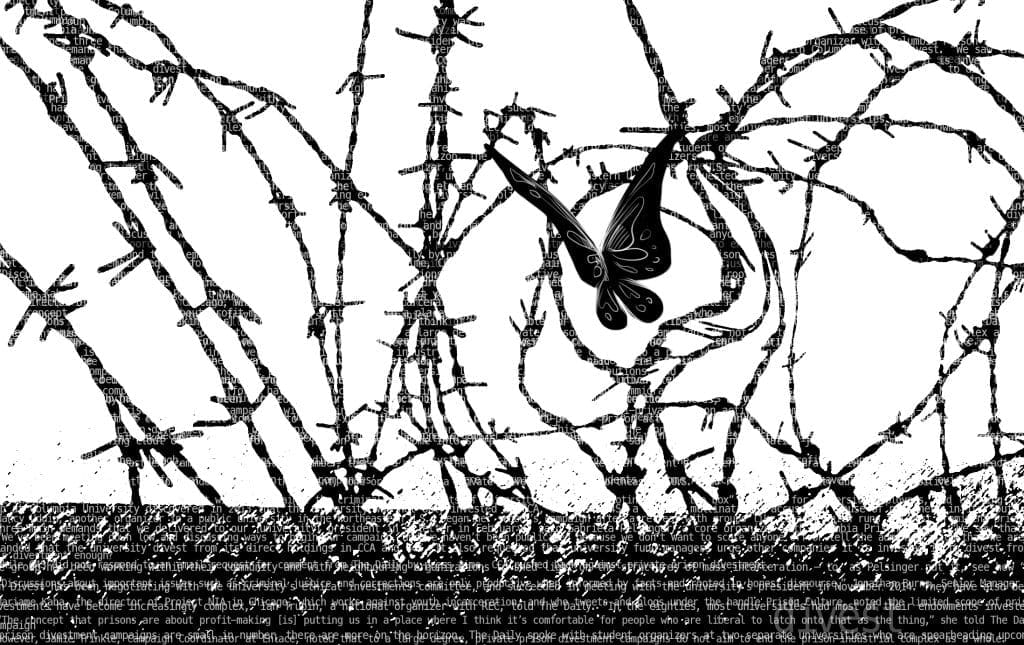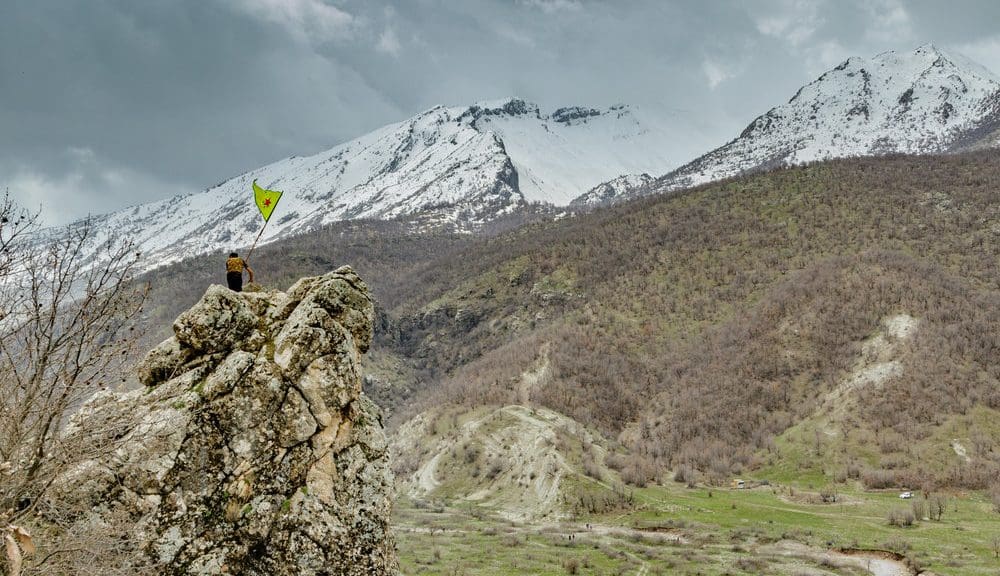Transcribed from the 27 June 2015 episode of This is Hell! Radio and printed with permission. Edited for space and readability. Listen to the full interview:
“Cooperatives are not just about doing good or creating change through our work externally, but also about bringing democracy and equality into the economy.”
Chuck Mertz: Imagine a world where you actually find your work to be something more than a job. Imagine, if you will, a world where a life’s work is actually fulfilling and expresses who and what you really are and believe, where the pursuit of happiness is actually happening every day. I know what you’re thinking. It’s hard to imagine. After all, this is hell.
But it’s actually happening, at least in some parts of our world. Here to tell us what steps we could take toward a happier place here on Earth: Rhiannon Colvin, who wrote the article Re-imagining the Future of Work, which is an extract from Resist: Against a Precarious Future, the third book in the Radical Futures series.
Thanks for being on This is Hell!, Rhiannon.
Rhiannon Colvin: Hello!
CM: Great to have you on the show. Rhiannon graduated two years ago, and after competing in the brutal graduate job market and researching solutions to youth unemployment in Portugal and Spain, she founded a group called AltGen, which supports 18- to 29-year-olds to set up cooperative businesses as an empowering and collaborative solution to youth unemployment.
You write, “Imagine that it’s 2025 and the world of work has changed. Today we do labor out of passion, not obligation. Nobody has a low-paid job or has to balance multiple jobs just to make rent. Work gives us meaning and direction, but it does not define who we are. The three-day working week means we have time to spend with friends and family, to contribute to our communities, and have a say in how society is run.”
That sounds fantastic. But are those things even the goal of today’s economy? And how much do you think we’ve forgotten that a functioning economy should give everyone a better quality of life?
RC: I don’t think that those are the goals of today’s economy, but they are the goals of many young people and progressive movements today. And it sounds like an unrealistic dream, but it’s something that really is possible through a number of different strategies I outline. In the UK, when people in government—or trade unions, even—talk about solutions to youth unemployment, they keep within the narrative of more and more jobs…in the same kinds of companies, in the same kind of way.
They don’t actually have any vision for what kind of future we want.
Do we really want to work more? I don’t want to work more. Or do we want to work less? Don’t we actually want to look at the quality of work that we have, and the power that we have in our work, and the ownership and the say, and whether we’re doing something we actually enjoy?
Work is where we spend most of our waking lives, yet half the people don’t like what they’re doing. And we talk about democracy in politics, but not in the economy. There’s no vision for what that future looks like. To be honest, I don’t think it will come from those in power right now. That’s why it needs to come from our generation, saying: “This is what we want to see in the future, and this is how we’re going to get there.”
CM: Do you think that the biggest obstacle to real democracy is “free markets,” in that we haven’t democratized our economy?
RC: I don’t think it’s necessarily the “free market” that’s the problem. I don’t want a state-controlled market either. But a market that is not controlled and led by the very people that exist within it—the consumers and the workers—is fundamentally problematic. That’s what the cooperatives that I support aim to do; they aim to give those key stakeholders a say. Once we bring people back into it, I think we’ll stop having such a psychopathic approach to the economy.
For me it’s not just a choice between a free market or a state-controlled market. That’s what I find interesting about coops. They are a way in between, that focuses on ownership and control and people’s voices being heard and functioning in the economy. For me it moves beyond that debate, and I think that’s important now, because we’ve been stuck in that binary narrative for a long time.
CM: You write about imagining a future in 2025 where there is “no unpaid intern working for a boss on a six-figure salary; one person is not paid ten times another; pay is allocated equally and fairly depending on the time and skills that each person has contributed that month; holiday and sick pay are mandatory; everybody has input into how the organization is run; colleagues are equal, and when decisions are made, they are made together; the profit a company makes gets shared among the people who make it possible—the workers, not some distant shareholders. In this labor market, competition and inequality are reduced and so are the feelings of injustice and worthlessness felt by many.”
Here in the States, this would be derisively called “socialism.” Would you call it “socialism?”
RC: No, I don’t think I would. I think it’s a very different approach. I don’t trust either the market that exists now or the state that exists now to create the change our generation wants to see. I think it needs to be led by us, which is why these suggestions are things like cooperatives and freelancers’ unions. It’s about the essentialization of power, and it’s about everyday people having ownership and power over what they’re doing. There’s a lot that we can do ourselves.
I want to move beyond the fight over whether it is capitalism or communism or socialism, because I don’t think those terms engage many people of our generation effectively. It’s actually about focusing on who gets to be the actors at any given point. Then we can start to have conversations with a lot more people, rather than being stuck in dogmatic areas.
CM: You also write, “In 2025, work generates a fair income, enables us to do what we love and to have a positive impact. Our economy is based upon principles of democracy, equality, sharing, and sustainability.”
But…will it make us rich?
RC: I mean, it depends on what your definition of “richness” or “wealth” is. If our key measure is GDP, and the growth of individual money is what we want to see, then no. That’s not what my vision of the future of work is about. It’s not possible, within the limits of the resources we have, for everyone to live the way rich people live right now.
It fundamentally comes down to how we measure well-being or wealth or happiness. Would you rather be in a job that earns you shitloads but means that you spend most of your life doing something you hate? Or would you rather have fulfillment in other ways?
It’s really about creating a new narrative, and I feel like we’re starting to turn towards that now. Yeah, you could go work in a bank and earn loads of money, but guess what? I get to be my own boss. I get to choose where I work, when I work, who I work with, what I do, why I do it, what impact it has. And it feels amazing. And yeah, I don’t have millions of dollars, but I really don’t care.
Clearly it’s very important that we have enough to live and meet our basic needs, and then some. But I’m much happier than many of my friends that work in banks and have loads of money. Because they don’t have time and they don’t have freedom and they don’t have ownership and they don’t have control.
I think we need to bring in a new narrative about what fulfillment is—and what we are doing this all for.
“Having interacted with the movement for the last few years, I would say there is a shift beginning to take place, and people are beginning to see cooperatives as transformative rather than just existing within the current system.”
CM: One of the things that you mention we can do, as you were just saying, is develop coops—and you help facilitate people who are trying to create them. But you wrote last year that coops are not a “new” alternative. There have been coops in the US for decades, and, as you point out, in England for centuries.
Why do you put so much confidence in coops, which is a practice that has been happening for over 150 years in England? Why do you put so much confidence in that as a way to challenge the system?
RC: For me it was a real revelation when I came across them, and I couldn’t believe that I hadn’t learned about them in my whole education.
In the UK, and you must have this in the US as well, there is such a huge culture around social enterprise and startups—and I can see that they’re innovating and doing good. But there is nothing there that fundamentally looks like structures of democracy in ownership and wealth. That’s why I think cooperatives are so radical and progressive. Because they’re not just about doing good or creating change through our work externally, but also about bringing democracy and equality into economy.
That’s why, for me, they are such a big part of the solution. But I would never claim that cooperatives alone are the only thing that is needed to transform the economy. And to some degree the movement has existed alongside capitalism, and has emulated its structures and ways of working. So there must also be a process of radicalizing the movement that exists, along with acknowledging that it’s working alongside other transformative campaigns. It’s not one panacea that’s going to create all the change.
For me, the question is, what can I do? And what can my generation do? Since we can’t trust companies or governments—tangibly, what powers do we have? We do have power to create change in the way that we work and the economies that we create.
But of course we’re going to need huger shifts and changes that will require government to be involved as well.
CM: And you write, “Worldwide, one billion people are already members of a cooperative; that’s one seventh of the world’s population. There are over 6,000 cooperative businesses in the UK; they also exist in all sectors of the economy. There are cooperative schools, art galleries, web design agencies, architects, construction firms, doctors, surgeries, and record labels.”
So there are all these cooperatives already happening. Do you think that the alternative economy, then, is already happening? And are these one billion people—the one-seventh of the world’s population that’s already in coops—is this the first step toward a better future?
RC: A colleague of mine always says it’s a way of “liberating” us…but it’s a way of making capitalism as nice as possible for now, by seeing that our working environments (the reality that we exist in and work in every day) are owned and run by us. But until we really have resources held in common, it’s going to be a process of commoning as many different elements and areas as possible through ourselves and through our work.
Yes, the cooperatives that exist are the beginning, and are part of the alternative economy that is emerging, and actually (I would argue) already exists across the world. But the problem we see is that many of the large-scale established cooperatives (I’m thinking of either cultural cooperatives or cooperative banks) might have, for example, two million members—but the members aren’t really engaged, they don’t really understand what the cooperative is or what the values are about. The way cooperatives work in the UK, you’re a member because you shop there. But does that mean that you really believe that’s the transformation of society?
So we’ve got high membership figures, but how many of them are engaged, and how many of them really believe in this different future? That’s what’s more questionable. But having interacted with the movement for the last few years, I would say that this is beginning to shift, and people are beginning to see cooperatives as transformative rather than just existing within the current system.
CM: Cooperatives are just one of four proposals that you offer on how we could create work that is more equal and fulfilling. Another one is this idea of universal basic income. Can you explain to people what universal basic income is? Because one of the things you say is that it would lead to less state bureaucracy, but from the way that I read it, you’re talking about the government paying everybody’s wages.
So could you explain to me what universal basic income is? I’m not too sure I have that great a grasp of it.
RC: The concept is basically that instead of having a complex system where taxes are paid and then distributed to certain people at various points in life—whether it’s through housing benefits or child benefits or other various things we have (in the UK anyways)—that actually every single person is given the basic amount that they need to live. So it eliminates all these different tiers and different kinds of benefits that people get at different levels.
There is also the situation in the UK (and other parts of Europe) where earning a certain amount of benefits can mean you don’t go and get a job, because you’d only be getting a little bit more money but having to work all the time. There are all these weird little traps that people live in.
So a universal basic income is the idea that we have generated enough wealth in the economy now that everyone should be able to have their basic needs met, but on top of that, they should be working and bringing in an additional amount of income. You’re not going to be able to live a luxury life off this basic income, but it’s enough so that no one will be on the street.
And on top of this, a lot of studies have shown that people in this position have a lot more freedom and control and choice over the work that they do. I genuinely think it would wipe out whole sectors of the economy, areas that people wouldn’t want to work in anymore because they would have more of a choice over what work they would do, and why and for whom. I think it would actually lead to more creativity and innovation.
It’s quite a radical concept, but it is being tried in a few places in a small-scale way. Switzerland will have a referendum on it in 2016. This is a nationwide referendum that required 100,000 signatures to get on the ballot. So while it seems “out there,” it’s also something very interesting that is being argued from both right and left perspectives.
CM: And there’s another proposal you offer, on something called freelancers’ unions. You write how “in the US a completely new organization called the Freelancers Union has been created. It has over 249,000 members and provides health insurance, disability allowance, and pensions, as well as campaigning for a ‘new form of mutualism’ that supports freelance workers being in control, collaborating together, and serving the community.”
So can you tell me any more about what freelancers’ unions are, and why people should be interested in this as an alternative way to approach our economy?
“Countries where the crisis has been severe are the key leverage points. We can learn from them and bring knowledge back. And we need to ensure that we’re identifying and supporting them, and showing that this is a different way that we can replicate.”
RC: First of all the rise of freelancing is a fascinating thing in itself; it’s happening across the economy and all over the world. A positive aspect of it is that people are choosing not to go and work at big companies, and are choosing freedom and control over their work. The problem with it is that it’s eroding workers’ rights, things like holiday pay and sick pay, as well as spaces for collaboration—not feeling isolated but working within a team. There is this lack of security.
What I’m interested in—and we don’t know the answer yet—is how we can have both freedom and security in our work. For me, this is the goal. The Freelancers Union in the US you just described is one example. But in Holland, also, there is the concept of broodfonds: people put a percentage of their income into a cooperative fund that then provides sick pay. In France there are cooperatives for entrepreneurs where, again, you join the cooperative as a freelancer doing your own individual work, but you give a percentage of your income in exchange for invoicing services, admin services, holiday pay, sick pay—and also you’re part of a supportive community and have more collective bargaining power.
This last part is key, because right now people are getting really screwed because they’re just one individual. But there is an organization in Belgium, for example, called SMartEu. They have 60,000 freelancers on their books, and they do all their invoices for them—and if any company screws over one freelancer, suddenly 60,000 know about it.
CM: Last year, you wrote how you “embarked upon a three-month research project in Portugal and Spain, where youth unemployment is 50%, with the question: what new ways of living and working are young people creating in response to the crisis? Youth in Lisbon were setting up social movements to campaign for basic citizens’ income and free transport for the unemployed. In Grenada, creative hubs to support youth in industries such as art and music. In Madrid, social centers offering affordable food, consultation on how to resist housing evictions, and free classes in media, web development and dance. Around Barcelona, youth had gone back to the land, reclaimed old buildings, and begun to grow their own food, sell bread, preserves, and furniture.
“All across the Iberian peninsula, new ways of working and living are emerging. However, the alternative that most inspired me was workers’ cooperatives. I found food coops, bike coops, cooperative bookshops, web development agencies, schools, and in one example a cooperative integral to provide all basic needs such as housing, education, healthcare, and childcare.”
Now, Rhiannon, Barcelona and Madrid have elected the “Indignada Mayors,” supported by Podemos. Barcelona voted mayor Ada Colau into office in May, and two weeks ago Madrid voters chose Manuela Carmena as their new mayor. How much is the revolution that you hope could create the 2025 utopia that you imagine—is that revolution happening right now on the Iberian peninsula?
RC: I think a huge part of it is happening now. In Europe at least—and maybe you can see it in America, in cases like Detroit; I see it across the world—these new ways emerged out of profound crisis. That’s always the case in human history, I think, a cycle of crisis and renewal. So what we’re seeing in Europe, particularly in countries like Greece and Spain and Portugal, is that people are creating these completely new ways of getting by because they have to. That’s why I think we’re seeing this real radicalism coming through.
But does it have to get that bad to get better? I don’t know the answer to that, but I think it partly explains why it’s emerging across southern Europe more than across northern Europe. It’s plenty bad here—youth unemployment is maybe 17%, which is not 50% but still unacceptable—so this growing and hustling is alive and well up here too, but it’s primarily been in these key points where the crisis has been severe.
I hope it’s not the case that it’s going to have to get that bad everywhere for people to turn to alternatives. But they will be the key leverage points. We can learn from them and bring knowledge back. And we need to ensure that we’re identifying and supporting them, and showing that this is a different way that we can replicate.
So I think it’s positive. It’s happening.
CM: One last question for you, Rhiannon, and it is our Question from Hell, the question we hate to ask, you might hate to answer, or our audience is going to hate your response. You write, “Critics of universal basic income suggest that it would lead to people doing no work at all. But experiments with basic income schemes in North America and Namibia have shown that not only did most people continue to work, but that it significantly increased entrepreneurial activity and the generation of new ideas. Even Google understands the benefits of allowing the space and freedom for their staff to pursue their own interests. Gmail was actually invented during “20% Time,” whereby employees can spend up to 20% of their time doing what they want. Unfortunately, the time is harnessed to corporate, capitalist ends—all ideas are owned by Google.”
So, Rhiannon, is big business, then, already co-opting coops and the cooperative idea?
RC: Yep. Definitely. It’s already happening. Big businesses are using open source technology, and are using a lot of the cooperative ideas—all of these apparently peer-to-peer businesses like AirBnB, they’re using it already. The sad thing is that the cooperative movement is not stepping up and using technology quite as well.
I keep saying to people in the movement, “I want the next Uber to be cooperatively owned and democratically run.” The real issue that we need to think about is how we get startup resources to innovate and to experiment with new ideas. That’s what the capitalists have control over.
So yeah, they are trying to co-opt it already, but I don’t think that’s a loss. I just think it puts more pressure on us to be the ones innovating and to keep showing what this real collaborative, peer-to-peer, open economy is about.
CM: Thanks, Rhiannon, I really appreciate you being on our show.
RC: Thank you very much for having me. Bye!
Featured image: Chalkboard menu at a Greek cooperative café (translation: “Building human relationships”). Source: Politeia2.org





